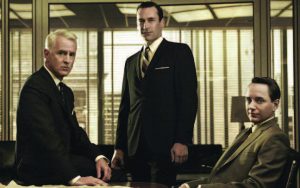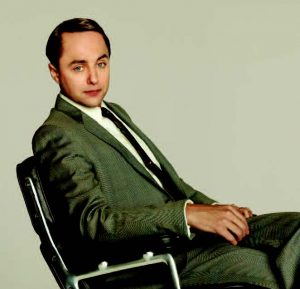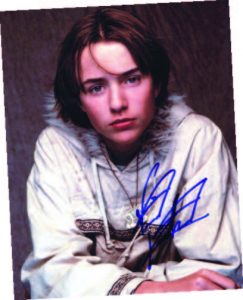Would you invite Pete Campbell into your home? Maybe a better question is: Could you keep him out? While you think about that, consider the man behind the mask, Vincent Kartheiser, who breathed life into one of Mad Men’s most indelible characters. He has been honing his craft since childhood, in films including Masterminds, Alaska and The Indian In the Cupboard, and later in Another Day In Paradise and Crime and Punishment in Suburbia, for which he received critical acclaim. Kartheiser is also familiar to fans of the WB television series Angel. When Editor-at-Large Tracey Smith sat down with him, she was wondering what all Mad Men fans do: How much of what we see on screen is Vinnie and how much is Pete? So, naturally, she asked…
EDGE: Peter Campbell is manipulative, maniacal, devious, shrewd and success-driven. Is there a little bit of Pete in Vincent Kartheiser?
VK: Is it me? No. But is there a little bit of Peter in Vincent? Yes. I think that if we did a really thorough search and investigation of our history, we would find that we all have those personality traits, either momentarily or in the long term. So, yes, there’s a part of Peter in me. I’m capable of things that aren’t great.

Courtesy of AMC
EDGE: Why do you think Matt Weiner cast you as Pete?
VK: I would like to believe that I fit his vision, that he was looking for somebody who had a certain amount of cockiness and confidence and sliminess, but didn’t really know he had the sliminess. I don’t necessarily have any of those things in real life…but I guess I did in the audition room. (laughs)
EDGE: Thanks, by the way, for doing the fashion shoot for us. Is that fun for you—like a vacation from your everyday wardrobe?
VK: Sometimes. We generally schedule those sorts of things on the weekend. If I’ve had a big week of work, sometimes I have lower energy for such events. And lots of times they put me in stuff that I would never understand how to wear, or hope to wear.
EDGE: On Mad Men, which era of fashion is closer to your taste?
VK: I don’t know. I can’t pull off loud outfits. It doesn’t suit me and I don’t have a great physique, so those really tight pants and those form-fitting shirts aren’t as great as a suit that covers up and makes everyone look relatively similar.
EDGE: You looked great in the Bespoke Couture. Will we be seeing the Vincent Kartheiser collection someday?
VK: No. No we won’t. I know nothing about fashion, nor do I really aspire to. That being said, you know Photoshop is one helluva thing and I’m sure it was utilized. I’m sure a lot of Photoshop is done on my photos!
EDGE: When Season One of Mad Men started shooting, how did you see your character evolving over the years?
VK: You try not to think too far ahead when you’re acting. I do try to think of the past and the present of the character. A character has dreams and hopes and fears, and I do access those, but I tried not to put too many of my own kind of desires into Pete’s character. I didn’t want to put that pressure on myself. I knew what the character wanted in the first season; he wanted to be Don Draper and he wanted to switch out of accounts and be a creative guy. That was something he thought he was more suited to, something that was exciting. I focused on that and I never made too many assumptions of where he’d end up plot-wise.
EDGE: Is Pete Campbell the first character you’ve played that has had to age significantly?
VK: Yeah, because most of the time you play characters—or at least I’ve always played characters—where the timeframe for the experience is very short. It’s one week, or one year, or one day. Very few stories span ten, twenty, thirty years. In the case of Pete, I aged as well, so it worked out.
EDGE: Is there anything about 30-something Peter Campbell you like better than 20-something Peter Campbell?
 VK: There are quite a few things about Peter Campbell that have changed, and I admire them. I think he fits his place in the world and his place in the office. He understands what his role is, what his limitations are, and what his fortés are. In those ways, it makes him an easier person to be around for other people. When a character or a person is always trying to change, or fit a mold that isn’t quite right for them, it’s uncomfortable—not only for them, but for everyone around them. It causes a lot of conflict. So I think it’s wonderful that he’s come to peace with his role in the world, which is to be an account man. At least that’s where he’s settled in. I think his envy and jealousy of people around him has simmered down a bit. He doesn’t need to hate as many people as he used to, which I think is partly due to aging. We all experience that. Because it was such a prominent part of his personality, it’s nice that it’s gone away. He still gets frustrated very easily and feels that nothing ever goes his way, that he’s always getting the short end of the stick, and has a “woe is me” outlook on life—and he still has a sense of entitlement. So not everything has changed. But he has calmed down a bit and stops trying to set fire to everybody around him.
VK: There are quite a few things about Peter Campbell that have changed, and I admire them. I think he fits his place in the world and his place in the office. He understands what his role is, what his limitations are, and what his fortés are. In those ways, it makes him an easier person to be around for other people. When a character or a person is always trying to change, or fit a mold that isn’t quite right for them, it’s uncomfortable—not only for them, but for everyone around them. It causes a lot of conflict. So I think it’s wonderful that he’s come to peace with his role in the world, which is to be an account man. At least that’s where he’s settled in. I think his envy and jealousy of people around him has simmered down a bit. He doesn’t need to hate as many people as he used to, which I think is partly due to aging. We all experience that. Because it was such a prominent part of his personality, it’s nice that it’s gone away. He still gets frustrated very easily and feels that nothing ever goes his way, that he’s always getting the short end of the stick, and has a “woe is me” outlook on life—and he still has a sense of entitlement. So not everything has changed. But he has calmed down a bit and stops trying to set fire to everybody around him.
EDGE: What is the value of a Pete Campbell to an ad agency?
VK: I think his value is obvious. He’s a good account man, he works hard, he has ambition, he has loyalty to the people around him and to the company, he’s not afraid to get his hands dirty—he’s not afraid to get his name dirty—and he’s not afraid to use everything in his arsenal to get the job done. He used the death of his father to get an account, he convinced Joan to spend the night with Herb Bennet to land Jaguar, and he is willing to go pretty far into a moral shadow. I don’t think it’s good for the world, but it does bring value to the agency. Actually, I have a hard time calling those things “value” because they’re unscrupulous. Unfortunately, that’s a part of the business world. I don’t think that all companies run their businesses that way, but some certainly do, and in those businesses there are people like Pete Campbell that drive the train, and it accomplishes something.

Upper Case Editorial Services
EDGE: What’s it like playing a character that many viewers love to hate?
VK: I’m just the actor. The people who really created this character and did the work are the writers. In that writer’s room, we have people who have been agents, who have been advertisers. We have people who are still in advertising who consult, and we have a team of people who spend hours and hours doing research on the time, on the year, on the date, on products, on ad campaigns, on the types of people and the types of stories. Matthew Weiner and the writing team take all of this info and create these characters. I think it’s an honor that I haven’t ruined what they are trying to do—but it’s really that I’m just a vessel, and they really are owed the credit. By the way, you’re right. I get this all the time, people come up and say, “I work with a Pete Campbell.” They did a really good job of writing him in a realistic way, but still in a melodramatic way.
EDGE: Looking back, would you have written your character any differently?
VK: I wouldn’t have written anything differently. I’m very happy with everything they’ve given me. I’m honored that they’ve written what they’ve written. I don’t really live in a world of what-ifs. It gets too complicated.
EDGE: Pete says to Don Draper in an early episode, “A man like you, I’d follow into combat blindfolded.” Would you, Vincent, follow Jon Hamm into battle blindfolded?
VK: Well I wouldn’t follow anyone into battle. (laughs) I do feel he has my back. I think I can speak for all the actors that Jon is so supportive and is so consistent, he’s always giving 100 percent, he’s always present, he’s always good. I have off-days—there are days I can’t remember my lines or I’m struggling. Jon and many of the actors I work with are so, so strong. Jon is there so much and it’s Don’s story, so it is pivotal that he supplies his presence. Yet he does it almost effortlessly and I don’t know how. It’s a character trait that I admire greatly.
EDGE: There’s a lot of smoking and drinking on Mad Men, which is period-appropriate. But what are we to make of Pete’s food choices?
VK: He’s always eating childish food, like peanut butter and jelly sandwiches and Cap’n Crunch. I think Matthew is making a statement about this boy-man that Pete is—which is something that I can relate to. There’s something about being an actor, especially from when you’re very young. I’ve never had another job, I’ve had a very blessed life, I haven’t had to roughen up my hands too much. I think there’s something about being an actor, particularly though, that keeps you a little bit childish. It’s make-believe, it’s imagination, and I might be guilty of being a boy-man in some ways.
EDGE: I know you’re a fan of Jack Kerouac. He wrote that “The only people for me are the mad ones, the ones who are mad to live, mad to talk, mad to be saved, desirous of everything at the same time, the ones who never yawn or say a commonplace thing, but burn, burn, burn like fabulous yellow roman candles exploding like spiders across the stars.” Who are Peter Campbell’s people?
VK: The man who never grew old enough to understand what he wrote! I think you start yawning when you hit a certain age and Jack never got to that age. Who are Pete’s kinds of people? New Yorkers. Not the “new” New Yorkers, not the hippies that are taking over the Village in the late 60’s, or the drug dealers in the boroughs or any of those sorts of things, but the “old” New Yorkers. I would say his kinds of people are the logical ones, the ones that he can understand why they do what they do. They don’t get off-course, they stay the course. I think that statement by Jack Kerouac, he’s really just talking about himself. He’s saying the kinds of people I like are like me. So, the kinds of people that Pete Campbell likes—if we’re using that template—are the kinds of people like Pete.

Photo by Michael Yarish courtesy of AMC
EDGE: And who are Vincent’s kind of people?
VK: Personally, as Vincent, I like quiet people…and I wish I were one. (laughs) I like people who think about what they say before they say it. I wish I were one of them, too! I like kind people, gentle people, people who aren’t out for number-one, people who are out for everyone—people who don’t jump to judgment but try to empathize. I’m not really any of those things, and I’m not talking about some crazy-eyed cult. I’m just talking about someone that is real, someone who really sees that their needs aren’t the needs of everyone. That their life isn’t any more important than anyone’s. I don’t know, maybe there’s no one like that in the world, but I feel like I meet them all the time.
Editor’s Note: The only question Vincent Kartheiser dodged in this interview was about his girlfriend, Alexis (Gilmore Girls) Bledel. Now we know why. Vincent and Alex tied the knot over the summer in a secret ceremony. Log onto edgemagonline.com to read more about Vincent’s other television and film roles, and how he kept the EDGE crew loose on his fashion shoot.





